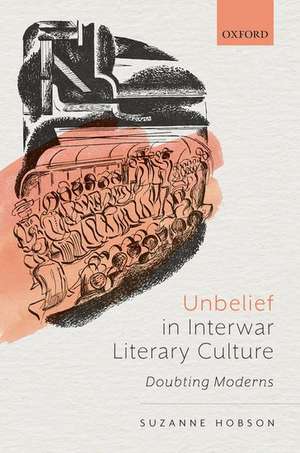Unbelief in Interwar Literary Culture: Doubting Moderns
Autor Suzanne Hobsonen Limba Engleză Hardback – feb 2022
Preț: 473.94 lei
Preț vechi: 561.74 lei
-16% Nou
Puncte Express: 711
Preț estimativ în valută:
90.69€ • 96.98$ • 75.61£
90.69€ • 96.98$ • 75.61£
Carte disponibilă
Livrare economică 17-22 martie
Preluare comenzi: 021 569.72.76
Specificații
ISBN-13: 9780192846471
ISBN-10: 0192846477
Pagini: 250
Ilustrații: 7 Illustrations
Dimensiuni: 160 x 240 x 23 mm
Greutate: 0.51 kg
Editura: OUP OXFORD
Colecția OUP Oxford
Locul publicării:Oxford, United Kingdom
ISBN-10: 0192846477
Pagini: 250
Ilustrații: 7 Illustrations
Dimensiuni: 160 x 240 x 23 mm
Greutate: 0.51 kg
Editura: OUP OXFORD
Colecția OUP Oxford
Locul publicării:Oxford, United Kingdom
Recenzii
The book wonderfully portrays the complex ways in which arguments for and against unbelief-as well as modern and anti-modern elements-often interacted even within the works of the same author...Hobson's study of the doubting moderns-and of the doubts about modernity-provides a rich, multi-layered model that students and scholars will undoubtedly benefit from following.
Hobson demonstrates the manifold ways in which unbelief operates in modernist literary production...Unbelief is a detailed, informed, and innovative account of rational doubt and abiding hope in the interwar period.
Doubting Moderns is a welcome addition to recent scholarship on modernism and religion, a field shaped by Hobson's earlier monograph Angels of Modernism: Religion, Culture, Aesthetics 1910-1960 (2011). By means of a careful study of Rationalist intellectual networks, Hobson broadens our understanding of religious (and irreligious) debate in the first half of the twentieth century, offering insightful readings of a range of often neglected experimental texts. Her sensitive consideration of how modernist literature has shaped our secular age ensures that this study provides insights that will be welcomed by scholars working in the interdisciplinary field of literature and religion, post-secular studies, and twentieth-century religious history.
It mostly goes without saying that modernism was, by definition, an era of religious doubt and disillusionment... But in this fascinating new book by Suzanne Hobson of Queen Mary University of London, a different sense of the era emerges, one where committed secularism could invite critical sanctions and where open unbelief often met with polite silence from literary modernists.
Hobson demonstrates the manifold ways in which unbelief operates in modernist literary production...Unbelief is a detailed, informed, and innovative account of rational doubt and abiding hope in the interwar period.
Doubting Moderns is a welcome addition to recent scholarship on modernism and religion, a field shaped by Hobson's earlier monograph Angels of Modernism: Religion, Culture, Aesthetics 1910-1960 (2011). By means of a careful study of Rationalist intellectual networks, Hobson broadens our understanding of religious (and irreligious) debate in the first half of the twentieth century, offering insightful readings of a range of often neglected experimental texts. Her sensitive consideration of how modernist literature has shaped our secular age ensures that this study provides insights that will be welcomed by scholars working in the interdisciplinary field of literature and religion, post-secular studies, and twentieth-century religious history.
It mostly goes without saying that modernism was, by definition, an era of religious doubt and disillusionment... But in this fascinating new book by Suzanne Hobson of Queen Mary University of London, a different sense of the era emerges, one where committed secularism could invite critical sanctions and where open unbelief often met with polite silence from literary modernists.
Notă biografică
Suzanne Hobson is Reader in Twentieth-Century Literature in the Department of English at Queen Mary University of London. She is the author of Angels of Modernism: Religion, Culture, Aesthetics 1910-1960 (Palgrave Macmillan, 2011) and editor with Rachel Potter of The Salt Companion to Mina Loy (Salt, 2010). She has published articles and book chapters on a range of topics including religion and spirituality and modernist travel writing. She is past Chair of the British Association for Modernist Studies and co-organizer of the London Modernism Seminar.
